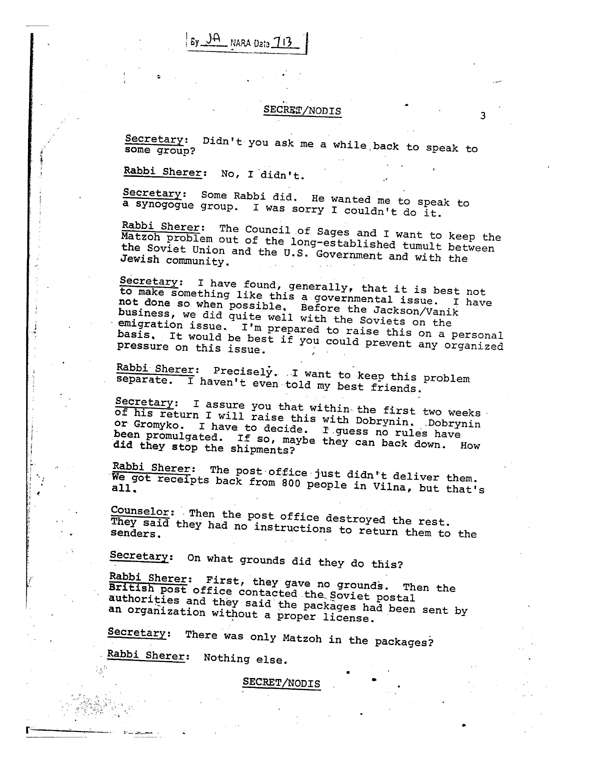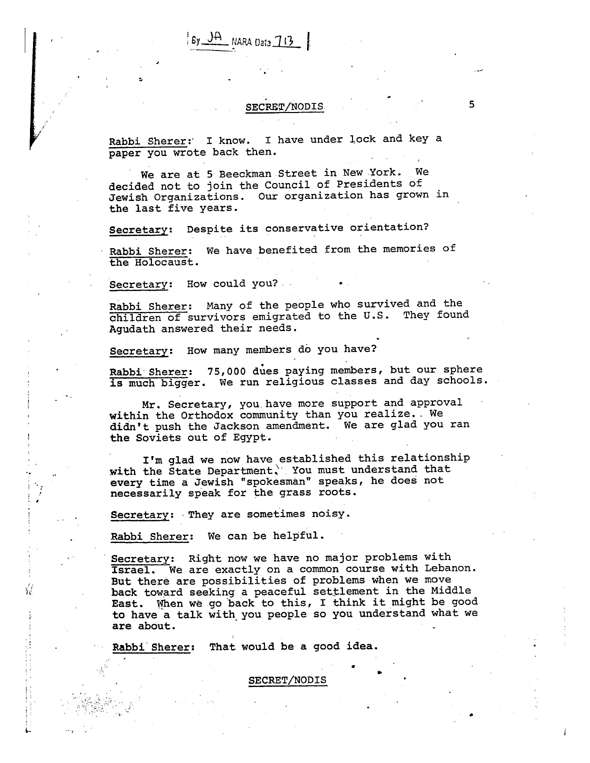In certain ways this document is a snapshot of the Agudah under Rabbi Moshe Sherer at that time ("both pro and con" as my friend put it). It really speaks for itself, and I don't want to inflict my interpretations onto readers, but it is my blog. Here are some thoughts:
- Rabbi Sherer repeatedly refers to the "Torah sages" privately; not only wasn't it just rhetoric for the masses, but he even brings them up in a closed meeting with the Secretary of State.
- Although I certainly don't want to give the impression that I am easy on Soviet persecution, it is interesting that this issue seems to concern extra special kosher matzah, as opposed to regular old kosher ones. Sherer agrees with Kissinger that matzah could be baked in the Soviet Union, but "because of our meticulous requirements, many people do not look upon it as kosher." Some might suggest that if kosher matzah was available, perhaps it wasn't worth making a big deal over. Of course he explicitly asks that the issue be separated from the normal Soviet Jewish issue, which shows that even though this was a question of frumkeit, he wisely tried to keep it from becoming a federal case.
EDIT: Rabbi Josh Waxman remarks that in 1973 someone he knows personally saw matzah baking in Odessa. There the vat in which the dough was being mixed was encrusted. Thus, those matzos were not kosher at all. Whether or not this was the case in Riga in 1976 is unclear, but it does not seem so unfair to assume it was. Thus this might not really have been a case of frumkeit and chumra, but rather of no kosher matzos really being available at all.This is not clear from the way it was discussed with Kissinger, but read with this additional knowledge it is possible to see that is what he meant.
- Rabbi Sherer's candid admission that the Agudah's growth in the prior five years was "despite [the Agudah's] conservative orientation" (Kissinger's words) but they did "benefit[] from the memories of the Holocaust," by which he means that the immigrant survivors and their children joined.
- Kissinger doesn't really seem to know who he is. He knows he is speaking to a rabbi, and he asks him which is his congregation. Rabbi Sherer reminds him that he is from the Agudah. Kissinger tells Sherer that he was in the Agudah as a child. Rabbi Sherer tells him that he knows all about it: there's a paper written by the child Agudist Kissinger kept "under lock and key." Someone who knows these things tells me that it is supposedly on yishuv ha-aretz, but of course it hasn't seen the light yet.
All in all, a pretty good picture of sincerity and diplomacy. The Holocaust statement is surprising, but it's not meant to say that they exploited the Holocaust. Rather it's an honest assessment, and he did not resort to exaggerated claims regarding the ideological importance or attractiveness of Agudath Israel to explain its growth. A window into the Golden Age of the Agudath Israel of America.






> "because of our meticulous requirements, many people do not look at is kosher."
ReplyDeleteShould say: "...do not look upon it as kosher."
There's also a "Tthe" typo in the post.
> "Here is an interesting declassified document from 1976. "
Would you care to describe how you came across the document?
-Phil
Kissinger is familiar with "Agudath"? Perhaps that the transcriber's error.
ReplyDeleteYou gotta love how Sherer makes himself out as the good guy, as opposed to all those loud and annoying Jews pushing for Jewish issues (the JDL, Jackon-Vanik, etc.) that Kissinger doesn't like. Lovely.
oops! no, not Sherer. a different source, whom I know personally. sorry for the mixup.
ReplyDeletekt,
josh
I think Sherer had to push the "some people might not look upon as kosher" line because otherwise he could get tangled up in disputes with other people who claim it is kosher. When dealing with Gentiles of secular Jews, it's wiser to avoid these types of situations.
ReplyDeleteSee my edit.
ReplyDeleteAnonymous, I don't see voting here. I see "Dr. Kissinger, we know you really don't like the JDL or Jackson-Vanik. Neither do we. We're the *good* Jews."
ReplyDeleteOK, sometimes you have to say stuff like that. But it's distasteful nonetheless.
Phil, thanks for being my typo police. ;-)
ReplyDeleteI don't want to reveal all my trade secrets publicly, so why don't you email me?
75,000 dues-paying members? In 1976?
ReplyDeleteI didn't see Kissinger ask him to prove it. But I suppose it's possible if it includes entire families.
ReplyDeleteR. Josh Waxman's report is only a second hand report made thirty years ago about a completely different city. Lo maileh vilo moired.
ReplyDeleteDF
"Agudath" as a shortened reference to "Agudath Israel" is a vulgarism that I've seen before. Not everybody is up on the grammatically proper use of "semikhuth."
ReplyDeleteI've seen it as well. But if Kissinger was actually a *member* he should have known better, unless he was (or became) a total am ha'aretz.
ReplyDeleteSomeone can probably corroborate my memory of seeing a jahrzeit plaque for his mother Paula (d. 1998) in the Breuer shul in the Heights.
ReplyDeleteI think she did go to Breurers. On the subject of plaques, but otherwise completely unrelated, in Rabbi Wackslack's shul in Long Beach there's a plaque dedicated by Charles Krauthammer.
ReplyDeleteDF
On the subject of plaques, here is Bugsy Siegel's yahrzeit plaque in the Lower East Side. Kind of disgusting, but also kind of cool:
ReplyDeletehttp://benatlas.com/2009/12/our-master-and-teacher-bugsy-siegel/
Wow. That is actually quite cool. [I dont see the disgusting part] Beirush ben R'Mordechai Halevi. Just one more name among a hundred other plaques. Makes your realize simultaneosuly that "just one guy" can have a big impact on the world, but also that, in the end, you are just another guy, amid a never ending succession, who will eventually fade away. Very contemplative.
ReplyDeleteThen there was noted gangster Arnold Rothstein, "the J. P. Morgan of the underworld," who came from a frum family and whose hesped in 1928 was delivered by Rabbi Leo Jung. I wish the transcript were available.
ReplyDeleteKol hakovod for bring this document to light. The non-kashrut of whatever matzah the Soviets were allowing to be baked at that time was fairly well-known in religious Western Jewish circles. Agudath Israel, with its orientation very different from Modern Orthodox, was very much shtadlanut-oriented on Soviet Jewry through the mid-1980s.
ReplyDelete- Glenn Richter
(former national coordinator, Student Struggle for Soviet Jewry)